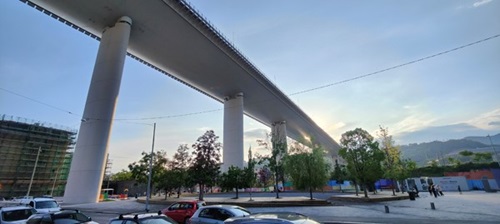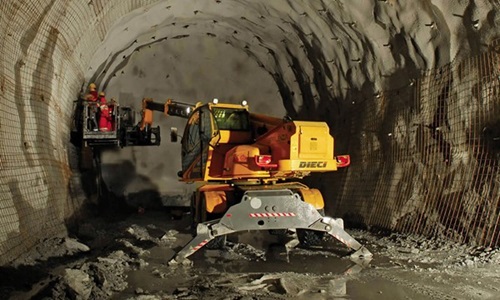Italy’s infrastructure landscape is undergoing a major transformation. After years of underinvestment, the country is now experiencing an influx of substantial public and private funding aimed at modernising its transportation network. Projections indicate a 2.6% increase in Italian infrastructure expenditure over the 2021-2026 period and a sustained annual growth rate of 1.7% through to 2031 – figures well above the Eurozone average. This resulting surge in infrastructure projects presents a golden opportunity for the concrete industry, which is poised to play a pivotal role in building a more resilient and future-proof Italy.
“The next few years will be a defining moment for the Italian concrete sector,” says Fabio Potestà, director of Mediapoint & Exhibitions, the company organising GIC, Europe’s largest dedicated concrete tradeshow in 2024. “With significant investments planned for highways, railways, bridges, tunnels, and viaducts, GIC 2024 will provide a crucial platform for industry players to connect, showcase their latest innovations, and capitalise on this exciting growth potential.”
A wake-up call for modernisation
The urgent need to modernise Italy’s ageing infrastructure was brought sharply into focus by the widely reported collapse of the Morandi Bridge in Genoa in 2018. The tragedy highlighted how many of the country’s key infrastructure assets, built during the post-war construction boom, are reaching the end of their lifespan and require immediate attention.
Two years later, amid the global pandemic, the opening of the Morandi Bridge’s replacement, the new San Giorgio Bridge, became a symbol of the importance of infrastructure investment not only for public safety but also as a catalyst for economic revival. Politicians clearly heeded this call and have demonstrably prioritised infrastructure development and maintenance, positioning it as a cornerstone of Italy’s national strategy for post-pandemic recovery and future resilience.
€27.74 billion EU funding for Italy’s transport infrastructure
The Italian government’s commitment materialised in the form of Italy’s National Recovery and Resilience Plan (NRRP), which was formally approved by the EU in July 2021 and earmarks €23.74 billion in funding from the EU’s Recovery and Resilience Facility (RRF), specifically for the creation of a more modern and sustainable network of roads, railways, ports, and airports.
Significant initiatives include the 364 km Ionian Highway (also known as the SS-106) upgrade project, the 200 km Naples-Bari high-speed railway, Terzo Valico dei Giovi (the 53 km Genoa-Milan high-speed railway), and the 67 km Brenner Base Tunnel (BBT) between Fortezza in Italy and Innsbruck in Austria, which will be the world’s longest underground railway connection upon completion.

With a strict deadline to finalise the RRF financing of projects by the end of 2026, the entire construction supply chain is mobilising to ensure readiness. Furthermore, this positive momentum in the Italian construction equipment and materials markets is expected to continue until 2031 as projects reach their final stages.
Attractive international private investment propositions
At the same time, the Italian infrastructure sector is also attracting significant foreign interest, fuelled by Italy’s strategic position within the Eurozone and the opportunity to address existing critical infrastructure gaps. 71% of international companies, financial institutions, and infrastructure funds surveyed in the 2023 EY Infrastructure Barometer revealed that they have invested in financed Italian infrastructure projects over the past four years, underscoring the immense potential in the Italian market for international and domestic players.

Given Italy’s vast network of ageing bridges, viaducts, and tunnels, where maintenance costs often outweigh the economic viability of repairs, the demolition and recycling of concrete structures will also be a crucial topic at GIC 2024. Both exhibitors and conference speakers will be exploring sustainable solutions for responsible demolition and material recycling, promoting a more circular economy within the construction industry.
GIC 2024: A gathering of industry leaders
Taking place in Piacenza, Italy, from 18-20th April, GIC 2024 is set to surpass the 234 exhibitors and 5,000 visitors at the 2022 edition, which was still impacted by COVID-19. This year’s event is anticipated to draw a record number of participants, particularly from outside Italy.
GIC 2024 is sponsored by FEDERBETON (the Italian federation of cement and concrete manufacturers), ASSOBETON (the Italian national trade association of industries producing concrete products, components and structures), ATECAP (the Italian technical and economic association of ready-mixed concrete), and almost 60 other associations representing various aspects of the concrete industry, from raw material extraction to recycling.
With Italy’s infrastructure sector on the cusp of a significant transformation, GIC 2024 is a vital hub for the concrete industry to connect, innovate, and propel the nation’s infrastructure development forward. The future of Italian infrastructure is being built, and concrete is at the heart of it.
Find out more about GIC 2024 and register for your free visitor’s pass at www.gic-expo.it

